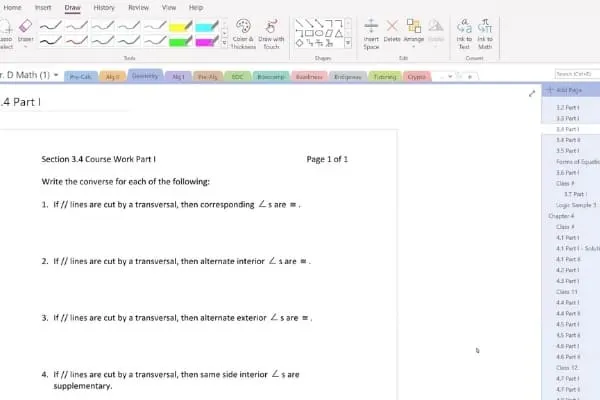Are you wondering whether live online math classes or self-paced ones are better for your child? Here’s how they stack up, plus six questions to help you decide.

I received free access to Mr. D Math’s Algebra 2 live online math course for review purposes and I was compensated for my time. All opinions are my own and I am not required to post a positive review.
Last month, I shared my latest review of Mr. D Math’s self-paced math classes. We’ve been taking Mr. D’s classes for three years now and we are absolutely thrilled with both the experience and the progress our kids are making in their math lessons.
This year, however, is the first year we’ve had an opportunity to test out Mr. D Math’s live online math classes. I’ve had some people asking me whether I recommend the self-paced or live version, so I’m really excited to offer this comparison.
Both options are excellent and share most of the same features, but there are a few key differentiators you’ll need to consider when choosing the online math class that’s best for your family.

Later on in the review, I’ll give you six key questions to ask yourself as you make the decision between self-paced and live online math classes.
But first, let’s get into what makes each of these homeschool math programs special.
Note: The actual course reviewed in the self-paced math class review is Algebra 1 and the course reviewed here is Algebra 2. This allows you to learn more about each of the two courses. However, we can still compare the two teaching methods fairly as the methods are identical no matter which level you take.
We’ll begin with the elements that are the same between the live online Algebra 2 class and its self-paced equivalent.
Mr. D Math Live Online Math Class: Algebra 2 Overview
Mr. D’s Algebra 2 class picks up where Algebra 1 leaves off, though students are required to take a year of geometry in between.
Read my review of Mr. D’s self-based Algebra 1 class here.
The following subjects, introduced in Algebra 1, are expanded upon in the Algebra 2 class:
- equations and inequalities
- linear relations and functions
- systems of equations and inequalities
- quadratic functions and relations
- polynomial functions and relations
- radical functions and relations
- probability and statistics
Additionally, these new concepts are introduced:
- matrices
- inverse functions and relations
- exponential and logarithmic functions and relations
- rational functions and relations
- conic sections
- sequences and series
Format of Mr. D Math’s Online Classes
Whether students opt for the live or self-paced version of the course, they will have access to all the same materials.
Like all of Mr. D’s math classes, Algebra 2 follows a two-part format. Each half of the course contains six chapters and one semester exam.
Each chapter contains five to nine lessons.
Within each lesson, students will find an excellent instructional video created by Mr. D himself. As I’ve noted in earlier reviews, Mr. D is an excellent instructor who takes complex mathematical subjects and makes them easy to understand.
Although I loved math as a student, I think I would have loved it even more if I’d had someone like Mr. D to explain it to me when I got stuck.
The videos provide exceptional value because students can replay them as many times is as necessary for comprehension. Think about your own days as a math student: remember how frustrating it was when the teacher moved too fast in a lecture, and you missed some important piece of information?
And then they just moved on and you were left with a knowledge gap that may have persisted throughout high school or even beyond?
With Mr. D’s videos, that is never a problem. When my daughters get stuck on their assignments, I always ask them to watch the videos again, and every single time, they pick up what they need on the second time through the math lesson.
In addition to the videos, they also have assignments to print out and complete, solutions, quizzes, and periodic spiral reviews, all of which help them build mastery of the subject.
One thing I love about Mr. D Math is that the assignments are designed to be printed off and completed on paper, which is not always the case with online math programs. As a kinesthetic learner, I need to write every step out with my own hand before I fully understand a math problem, and I love that Mr. D Math encourages my children to build that discipline of working through each step on paper.
In addition, all students have access to several live online math help sessions that Mr. D and his team of instructors hold each week, so there is always a live math teacher available to help your kids out if they get stumped.
The Differences Between Live Online Math Classes and Self-Paced Math Classes
While the differences between the live online math classes and the self-paced options are few, they are significant.
They fall into three categories:
- Accountability
- Pacing
- Routine
The Importance of Accountability
Some people are inherently self-motivated. Put a task on their task list, and they’ll jump at the chance to check it off.
Others have no self-motivation at all. If nobody’s holding them accountable, they’ll do hardly anything at all.
Most of us fall somewhere in the middle.
We are motivated to do the things that we love and that come naturally to us, and we procrastinate when it comes to the things we don’t enjoy or that make us feel challenged.
It is with that latter group of tasks that accountability becomes the lynchpin.

If we have someone else holding us accountable to do the things that are hard for us, we are far more likely to do them.
And sometimes, the homeschool parent is not the right person to provide that accountability.
If the subject is emotionally charged (as math can be for a lot of kids) or there are other pressures in the parent-child relationship, having a third party hold your child accountable for getting their math work done can be a livesaver.
This was the case for our family.
One of my daughters had done really well with Mr. D’s self-paced classes until this year, but then she just hit a roadblock. Suddenly, math was overwhelming for her again and she just kept getting further and further behind.
I would adjust her schedule week after week, but she felt like I was still giving her too much work.
So, we switched to the online class and it made a world of difference.
Because it was a mid-year switch, we had to go into the accelerated one-semester live online math class, so the pace was much faster than she was used to. But because she had that accountability from someone who wasn’t me, she rose to the challenge.
In the four months before she switched, she was able to complete three chapters. In the one month since she switched, she’s already completed two-and-a-half chapters and is nearly at the semester exam.
The work is still hard for her, but she’s chosen to make it a priority because she knows the accountability is there.
If you have a child who struggles to manage their time and keep up with a self-paced schedule, and if you don’t want to be the one managing that schedule, the live online math classes might be a better fit for your family.

Pacing in Live Online Classes vs. Self-Paced Classes
This is probably self-explanatory, but self-paced classes are, well, self-paced. You do them on your own timing and can take however long you want to complete them.
This can work in your favor or against it. For the same reasons mentioned above, many kids struggle with self-pacing. They know they’re supposed to do a certain number of minutes or pages of math each day, but they get distracted, or they run into a problem they can’t do and don’t return to it for a few days.
Before you know it, they’re a month behind the schedule you’ve set out for them and they end up having to finish their math program in the summer, which is never fun! (Well, for me it might have been, math nerd that I was. But trust me, for my kids, it’s a real bummer).
With the live online classes, the pacing is determined for you. You have nine months to complete the program (or five months in the case of the compressed classes) and you’re going to cover a certain amount of material each week.
Your class meets for one or two hours per week and your teacher presents specific lessons. Your exams are assigned for specific weeks. Your assignments have due dates.

So which way is better?
Again, it really comes down to a matter of preference. For some kids, having to keep up with the class’s schedule can be stressful. It’s easier for them to work at their own pace. They might do a little bit more this month and a little bit less next month, depending on their family’s schedule, but they know they’ll get it done in good time.
For other kids, like my daughter, finishing on time to ensure a summer break was a key goal for her, one that she was having a hard time achieving on her own. Although the fast-paced nature of her course still creates some level of stress, it seems to be the healthy kind of stress that propels her forward toward achieving her goals, not the kind that paralyzes her.
Only you and your child know what’s best for them.
Establishing an Online Math Class Routine
As homeschoolers, one of the most important factors in managing our learning and goals is the establishment of a routine. Having a rough idea of what you’re going to accomplish each week is key to meeting your long-term goals for your students.
Taking online courses of any sort can certainly help in the establishment of a schedule or routine, but live online classes far more so than self-paced ones.
With live online math classes, you need to set aside certain time slots each week to attend your class. You also need time beforehand to prep and time afterwards to process your learning. You also need to set aside sufficient time each day to do your assignments so you don’t fall behind in the class.
For my daughter, having her math classes as a stabilizing factor in her weekly schedule has really helped galvanize the rest of her routine. She had to get very serious about completing math, which has made her more aware of how she spends the rest of the time.
I love seeing her grow in independence as she starts taking over the task of managing her own time. Far too few adults in the workplace know how to do this well, and I think it’s a skill that’s going to serve her very well when she graduates.
So Which One’s Right for Your Child?
I hope I’ve established that the answer to this question really depends on your family, your individual children, and the specific math classes they want to take.
Here are some questions to ask yourself in making this determination:
- How good is my child at managing his or her own time?
- How much accountability to they need?
- Am I the right person to provide this accountability? (Hint: if you and your child are having regular arguments about math, you may not be.)
- Do they work well under the pressure of a strict schedule or does that create an unhealthily stressful situation for them?
- Does having live classes in their routine help them develop their time management skills or do they prefer to work as and when they feel like it?
- How do you feel about that preference? Does it fit in with your homeschool philosophy? (i.e. child-led vs. parent-led learning).
Other Live Online Math Classes Offered by Mr. D
If you’d like to give Mr. D’s live online math classes a try, here are the other math classes offered. Click here to view the whole course catalog.
- Preparing for Pre-Algebra
- Pre-Algebra
- Algebra 1
- Geometry
- Algebra 2
- Pre-Calculus with Trigonometry
- Math ACT Bootcamp
I hope you’ll check out both of the options offered by Mr. D Math. His classes have absolutely saved our homeschool. (I know I say that every time I review his classes, but it was true three years ago, and it’s still true today. I don’t think we would have survived math if we hadn’t made the switch).
Leave a comment below and let me know whether you’ve had better success with self-paced classes or live ones.
And don’t forget to save this post to Facebook or Pinterest so you can find it later!

Sophie Agbonkhese is a writer, homeschooling mother of four, and a recovering overachiever (who occasionally relapses). She is the founder of My Cup Runs Over, a site dedicated to helping busy women simplify and enrich their lives. When she’s not writing or debugging websites, Sophie spends her time reading, dancing, bullet journaling, reading, gardening, listening to audiobooks, and striving fruitlessly to have a clean house for at least five minutes.



Amie
Tuesday 24th of May 2022
Thank you. This is a great comparison of the two! Did you feel like the videos for the self-paced courses were choppy? We have been looking into this program for a while now, but every time I watch one of the samples it makes me feel a little motion sick. Is this common or is it not that noticeable? Thanks!
SOPHIE AGBONKHESE
Wednesday 25th of May 2022
Hi Amie,
I haven't noticed that, but I admit I don't often watch the videos the whole way through. There have been a couple of times when I've had to sit with my kids and watch a video to learn a new topic (or one that I've forgotten), and I've never noticed a problem with it.
Mr. D Math does offer a 30-day money-back guarantee so if you're leaning toward the program, you could try it and see if it works for you. If it doesn't, you can get a refund.
Everyone I know who has used it has loved it though. My daughter is finishing grade 9 this year and she's getting grade 11 math credit for Mr. D's Algebra 2 course. I never thought we would get that far ahead in math, but the program was just smooth and robust and carried her all the way through.